By Telos Press · Monday, April 7, 2014 As many regular Telos readers know, Telos Press maintains an active, ongoing, and global internship program. One of the key features of this program is our TELOSthreads blogging project, in which students with an academic background in politics, philosophy, or a related field produce short pieces of writing and research based on individual articles from the Telos archive. At the recent Telos Conference in New York City, Tim Luke, Telos Press’s Book Editor, and Matt Applegate, a former Telos Press intern, sat down to talk about the program.
Continue reading →
By Matt Applegate · Thursday, March 13, 2014 As an occasional feature on TELOSscope, we highlight a past Telos article whose critical insights continue to illuminate our thinking and challenge our assumptions. Today, Matt Applegate looks at Paul Piccone’s “Students’ Protest, Class-Structure, and Ideology” from Telos 3 (Spring 1969).
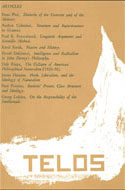 Paul Piccone’s 1969 essay “Students’ Protest, Class-Structure, and Ideology” captures the revolutionary ethos of that time in the United States. Hippies, student politics, Black Power, as well as the work of such figures as Régis Debray and Herbert Marcuse all come under Piccone’s earnest critical consideration. His primary concern, however, is the link between these student revolts and the state of education in the United States. On the one hand, Piccone is intent on charting the means by which hyper-industrialization and the technologization of work lead to open student rebellion. On the other, he is interested in understanding why student rebellion is effective in relation to other forms of revolutionary organization that appear alongside it. Paul Piccone’s 1969 essay “Students’ Protest, Class-Structure, and Ideology” captures the revolutionary ethos of that time in the United States. Hippies, student politics, Black Power, as well as the work of such figures as Régis Debray and Herbert Marcuse all come under Piccone’s earnest critical consideration. His primary concern, however, is the link between these student revolts and the state of education in the United States. On the one hand, Piccone is intent on charting the means by which hyper-industrialization and the technologization of work lead to open student rebellion. On the other, he is interested in understanding why student rebellion is effective in relation to other forms of revolutionary organization that appear alongside it.
Continue reading →
By Beau Mullen · Friday, March 7, 2014 As an occasional feature on TELOSscope, we highlight a past Telos article whose critical insights continue to illuminate our thinking and challenge our assumptions. Today, Beau Mullen looks at Gabriella Slomp’s “Thomas Hobbes, Carl Schmitt, and the Event of Conscription” from Telos 147 (Summer 2009).
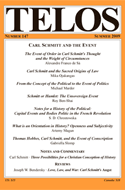 As Gabriella Slomp points out in the opening of her article “Thomas Hobbes, Carl Schmitt, and the Event of Conscription,” scholars are split on how to view the relationship between Hobbes and Schmitt. Some see Schmitt as Hobbes’s heir apparent, while others think that Schmitt’s thinking is in fact a rejection of much of Hobbes’s work. Both thinkers emphasize man’s warlike nature, they hold that the state exists to protect men from violent death at the hands of other men, and they maintain that a strong state with unlimited power is best suited to this aim. Both agree that man has an obligation to the state that is reciprocal to the duty of the state to provide security. In this piece, Slomp examines both Schmitt’s and Hobbes’s views of the extent of this obligation and comes to the conclusion that the two are in fact in disagreement. Using their writings on conscription, Slomp reveals that Hobbes has much more concern for the sovereignty of the individual whereas Schmitt never wavers in his affording primacy to the group or state. As Gabriella Slomp points out in the opening of her article “Thomas Hobbes, Carl Schmitt, and the Event of Conscription,” scholars are split on how to view the relationship between Hobbes and Schmitt. Some see Schmitt as Hobbes’s heir apparent, while others think that Schmitt’s thinking is in fact a rejection of much of Hobbes’s work. Both thinkers emphasize man’s warlike nature, they hold that the state exists to protect men from violent death at the hands of other men, and they maintain that a strong state with unlimited power is best suited to this aim. Both agree that man has an obligation to the state that is reciprocal to the duty of the state to provide security. In this piece, Slomp examines both Schmitt’s and Hobbes’s views of the extent of this obligation and comes to the conclusion that the two are in fact in disagreement. Using their writings on conscription, Slomp reveals that Hobbes has much more concern for the sovereignty of the individual whereas Schmitt never wavers in his affording primacy to the group or state.
Continue reading →
By Linas Jokubaitis · Tuesday, February 18, 2014 As an occasional feature on TELOSscope, we highlight a past Telos article whose critical insights continue to illuminate our thinking and challenge our assumptions. Today, Linas Jokubaitis looks at Paul Piccone and Gary Ulmen’s “Schmitt’s ‘Testament’ and the Future of Europe” from Telos 83 (Spring 1990).
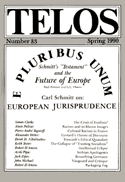 When Schmitt drafted his lecture “The Plight of European Jurisprudence” in 1944, he had reasons to believe that it would be his last lecture. After a failed assassination attempt on Hitler, his friend Johannes Popitz was arrested as an important conspirator in the plot and was later put to death. This is why the article by Paul Piccone and Gary Ulmen on this lecture is called “Schmitt’s ‘Testament’ and the Future of Europe.” The lecture did not prove to be Schmitt’s last. The irony is that what Schmitt wrote as his own testament can today be read as a testament of Europe. The validity of this claim depends only on how one views the current state of Europe. When Schmitt drafted his lecture “The Plight of European Jurisprudence” in 1944, he had reasons to believe that it would be his last lecture. After a failed assassination attempt on Hitler, his friend Johannes Popitz was arrested as an important conspirator in the plot and was later put to death. This is why the article by Paul Piccone and Gary Ulmen on this lecture is called “Schmitt’s ‘Testament’ and the Future of Europe.” The lecture did not prove to be Schmitt’s last. The irony is that what Schmitt wrote as his own testament can today be read as a testament of Europe. The validity of this claim depends only on how one views the current state of Europe.
Continue reading →
By Matt Applegate · Tuesday, February 11, 2014 As an occasional feature on TELOSscope, we highlight a past Telos article whose critical insights continue to illuminate our thinking and challenge our assumptions. Today, Matt Applegate looks at André Gorz’s “The Tyranny of the Factory: Today and Tomorrow” from Telos 16 (Summer 1973).
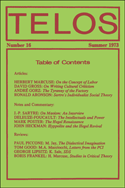 “There is a link between the crisis of School (school instruction) and the crisis of tyranny in the factory,” André Gorz proclaims in his 1973 article “The Tyranny of the Factory: Today and Tomorrow” (64). An Austrian-born social theorist, Gorz is known primarily for his interventions in political ecology and social analysis of capitalism. His focus on capital and education is not unrelated here, however. Substantively more than an abstract analysis of working conditions in the contemporary factory or a sweeping statement concerning the state of education in France, Gorz links the culture of factory labor to the imperatives of discipline and command in educational settings. The underlying claim here is that the logic of capitalism and the raison d’être of state-run education have become synonymous, resulting in both an auto-social response to capital’s hegemony in all forms of life and the elimination of pedagogical forms that inspire critical thought and practice. With this claim, at least three points of focus must be highlighted. “There is a link between the crisis of School (school instruction) and the crisis of tyranny in the factory,” André Gorz proclaims in his 1973 article “The Tyranny of the Factory: Today and Tomorrow” (64). An Austrian-born social theorist, Gorz is known primarily for his interventions in political ecology and social analysis of capitalism. His focus on capital and education is not unrelated here, however. Substantively more than an abstract analysis of working conditions in the contemporary factory or a sweeping statement concerning the state of education in France, Gorz links the culture of factory labor to the imperatives of discipline and command in educational settings. The underlying claim here is that the logic of capitalism and the raison d’être of state-run education have become synonymous, resulting in both an auto-social response to capital’s hegemony in all forms of life and the elimination of pedagogical forms that inspire critical thought and practice. With this claim, at least three points of focus must be highlighted.
Continue reading →
By Michael Millerman · Wednesday, February 5, 2014 As an occasional feature on TELOSscope, we highlight a past Telos article whose critical insights continue to illuminate our thinking and challenge our assumptions. Today, Michael Millerman looks at Carl Schmitt’s “Appropriation/Distribution/Production: Toward a Proper Formulation of Basic Questions of any Social and Economic Order” from Telos 95 (Spring 1993). Carl Schmitt’s The Nomos of the Earth in the International Law of the Jus Publicum Europaeum is available for purchase in our store.
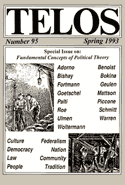 As indicated by its title, Carl Schmitt’s essay addresses to two problems: (1) what are the basic questions that we must raise about the social and the economic order? (2) how are those questions properly formulated? A moment’s reflection should reveal to us the great generality of these problems, which are designed—so Schmitt says—to answer a need for “comprehensive consideration” of social life in its unity (52). Whether we are asking about orders democratic, non-democratic, capitalist, or socialist; whether we inquire into totalitarianisms, fascisms, traditionalisms, ethno-nationalisms; whether we put the question to republics or princedoms, Schmitt is indicating that there are basic questions to ask, and he is suggesting that he has the key to their proper formulation. As indicated by its title, Carl Schmitt’s essay addresses to two problems: (1) what are the basic questions that we must raise about the social and the economic order? (2) how are those questions properly formulated? A moment’s reflection should reveal to us the great generality of these problems, which are designed—so Schmitt says—to answer a need for “comprehensive consideration” of social life in its unity (52). Whether we are asking about orders democratic, non-democratic, capitalist, or socialist; whether we inquire into totalitarianisms, fascisms, traditionalisms, ethno-nationalisms; whether we put the question to republics or princedoms, Schmitt is indicating that there are basic questions to ask, and he is suggesting that he has the key to their proper formulation.
Continue reading →
|
|
 Paul Piccone’s 1969 essay
Paul Piccone’s 1969 essay  As Gabriella Slomp points out in the opening of her article “Thomas Hobbes, Carl Schmitt, and the Event of Conscription,” scholars are split on how to view the relationship between Hobbes and Schmitt. Some see Schmitt as Hobbes’s heir apparent, while others think that Schmitt’s thinking is in fact a rejection of much of Hobbes’s work. Both thinkers emphasize man’s warlike nature, they hold that the state exists to protect men from violent death at the hands of other men, and they maintain that a strong state with unlimited power is best suited to this aim. Both agree that man has an obligation to the state that is reciprocal to the duty of the state to provide security. In this piece, Slomp examines both Schmitt’s and Hobbes’s views of the extent of this obligation and comes to the conclusion that the two are in fact in disagreement. Using their writings on conscription, Slomp reveals that Hobbes has much more concern for the sovereignty of the individual whereas Schmitt never wavers in his affording primacy to the group or state.
As Gabriella Slomp points out in the opening of her article “Thomas Hobbes, Carl Schmitt, and the Event of Conscription,” scholars are split on how to view the relationship between Hobbes and Schmitt. Some see Schmitt as Hobbes’s heir apparent, while others think that Schmitt’s thinking is in fact a rejection of much of Hobbes’s work. Both thinkers emphasize man’s warlike nature, they hold that the state exists to protect men from violent death at the hands of other men, and they maintain that a strong state with unlimited power is best suited to this aim. Both agree that man has an obligation to the state that is reciprocal to the duty of the state to provide security. In this piece, Slomp examines both Schmitt’s and Hobbes’s views of the extent of this obligation and comes to the conclusion that the two are in fact in disagreement. Using their writings on conscription, Slomp reveals that Hobbes has much more concern for the sovereignty of the individual whereas Schmitt never wavers in his affording primacy to the group or state.  When Schmitt drafted his lecture “The Plight of European Jurisprudence” in 1944, he had reasons to believe that it would be his last lecture. After a failed assassination attempt on Hitler, his friend Johannes Popitz was arrested as an important conspirator in the plot and was later put to death. This is why the article by Paul Piccone and Gary Ulmen on this lecture is called “Schmitt’s ‘Testament’ and the Future of Europe.” The lecture did not prove to be Schmitt’s last. The irony is that what Schmitt wrote as his own testament can today be read as a testament of Europe. The validity of this claim depends only on how one views the current state of Europe.
When Schmitt drafted his lecture “The Plight of European Jurisprudence” in 1944, he had reasons to believe that it would be his last lecture. After a failed assassination attempt on Hitler, his friend Johannes Popitz was arrested as an important conspirator in the plot and was later put to death. This is why the article by Paul Piccone and Gary Ulmen on this lecture is called “Schmitt’s ‘Testament’ and the Future of Europe.” The lecture did not prove to be Schmitt’s last. The irony is that what Schmitt wrote as his own testament can today be read as a testament of Europe. The validity of this claim depends only on how one views the current state of Europe.  “There is a link between the crisis of School (school instruction) and the crisis of tyranny in the factory,” André Gorz proclaims in his 1973 article “The Tyranny of the Factory: Today and Tomorrow” (64). An Austrian-born social theorist, Gorz is known primarily for his interventions in political ecology and social analysis of capitalism. His focus on capital and education is not unrelated here, however. Substantively more than an abstract analysis of working conditions in the contemporary factory or a sweeping statement concerning the state of education in France, Gorz links the culture of factory labor to the imperatives of discipline and command in educational settings. The underlying claim here is that the logic of capitalism and the raison d’être of state-run education have become synonymous, resulting in both an auto-social response to capital’s hegemony in all forms of life and the elimination of pedagogical forms that inspire critical thought and practice. With this claim, at least three points of focus must be highlighted.
“There is a link between the crisis of School (school instruction) and the crisis of tyranny in the factory,” André Gorz proclaims in his 1973 article “The Tyranny of the Factory: Today and Tomorrow” (64). An Austrian-born social theorist, Gorz is known primarily for his interventions in political ecology and social analysis of capitalism. His focus on capital and education is not unrelated here, however. Substantively more than an abstract analysis of working conditions in the contemporary factory or a sweeping statement concerning the state of education in France, Gorz links the culture of factory labor to the imperatives of discipline and command in educational settings. The underlying claim here is that the logic of capitalism and the raison d’être of state-run education have become synonymous, resulting in both an auto-social response to capital’s hegemony in all forms of life and the elimination of pedagogical forms that inspire critical thought and practice. With this claim, at least three points of focus must be highlighted.  As indicated by its title, Carl Schmitt’s essay addresses to two problems: (1) what are the basic questions that we must raise about the social and the economic order? (2) how are those questions properly formulated? A moment’s reflection should reveal to us the great generality of these problems, which are designed—so Schmitt says—to answer a need for “comprehensive consideration” of social life in its unity (52). Whether we are asking about orders democratic, non-democratic, capitalist, or socialist; whether we inquire into totalitarianisms, fascisms, traditionalisms, ethno-nationalisms; whether we put the question to republics or princedoms, Schmitt is indicating that there are basic questions to ask, and he is suggesting that he has the key to their proper formulation.
As indicated by its title, Carl Schmitt’s essay addresses to two problems: (1) what are the basic questions that we must raise about the social and the economic order? (2) how are those questions properly formulated? A moment’s reflection should reveal to us the great generality of these problems, which are designed—so Schmitt says—to answer a need for “comprehensive consideration” of social life in its unity (52). Whether we are asking about orders democratic, non-democratic, capitalist, or socialist; whether we inquire into totalitarianisms, fascisms, traditionalisms, ethno-nationalisms; whether we put the question to republics or princedoms, Schmitt is indicating that there are basic questions to ask, and he is suggesting that he has the key to their proper formulation. 

